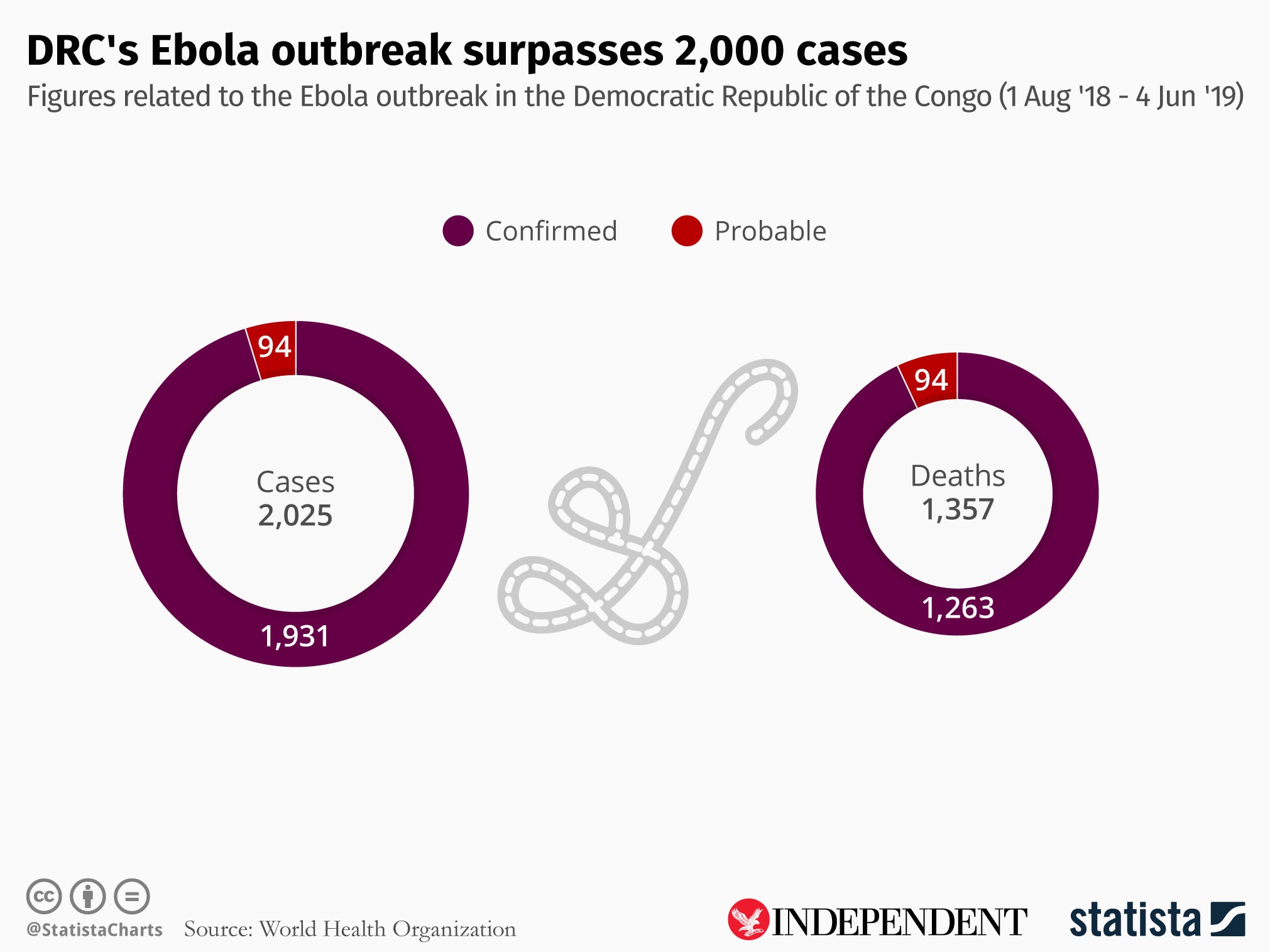Ebola epidemics ‘new normal’ as DRC cases pass 2,000
One in four cases undetected as civil war and mistrust worsen spread of deadly disease
Your support helps us to tell the story
From reproductive rights to climate change to Big Tech, The Independent is on the ground when the story is developing. Whether it's investigating the financials of Elon Musk's pro-Trump PAC or producing our latest documentary, 'The A Word', which shines a light on the American women fighting for reproductive rights, we know how important it is to parse out the facts from the messaging.
At such a critical moment in US history, we need reporters on the ground. Your donation allows us to keep sending journalists to speak to both sides of the story.
The Independent is trusted by Americans across the entire political spectrum. And unlike many other quality news outlets, we choose not to lock Americans out of our reporting and analysis with paywalls. We believe quality journalism should be available to everyone, paid for by those who can afford it.
Your support makes all the difference.At least 2,031 people are believed to have contracted ebola in the Democratic Republic of Congo (DRC), in what is now the second largest epidemic of the disease in history.
The figures come as health officials track 160 disease outbreaks around the world, with one official warning that battling multiple emergencies is the “new normal”.
The DRC’s health ministry said 1,937 ebola cases were confirmed in the nation, with a further 94 probable cases being examined.
The outbreak, which was declared on 1 August 2018, is the 10th and deadliest to hit the country.
Civil war and misinformation have significantly worsened the DRC epidemic, with one in four cases possibly going undiagnosed.
“I don’t think we’ve ever had a situation where we’re responding to so many emergencies at one time,” Michael Ryan, emergencies chief at the World Health Organisation (WHO), told the BBC.
He told the broadcaster that the WHO was tracking 160 disease events worldwide, nine of which are at the organisation’s highest emergency level.
“This is a new normal, I don’t expect the frequency of these events to reduce,” Mr Ryan said.
At least 1,367 people have died from ebola in the DRC and 552 people have recovered, but the WHO said it could be missing a quarter of all cases in eastern Congo.
Mr Ryan said violent unrest in the region could be preventing detection.
“We believe, let me be very cautious here, we believe we are probably detecting in excess of 75 per cent of cases – we may be missing up to a quarter of cases,” he said at a press conference in Geneva.
“We must get earlier detection of cases, have more exhaustive identification of contacts.”
The WHO was forced to temporarily halt response activities in April after Richard Valery Mouzoko Kiboung, an epidemiologist, was killed when armed militia attacked a hospital.
Mr Ryan said that, on average, 88 new cases had been confirmed each week over the last two weeks, down from the 126 cases per week diagnosed in April 2019.

Medical staff working in the DRC have been attacked by locals, who mistrust foreigners and government officials.
Many people fear going to ebola treatment centres, choosing instead to stay at home and risk transmitting the disease from the virus to family and neighbours.
Others believe the disease is being spread on purpose or that its existence is a lie.
Mr Ryan said the situation was “extremely volatile” and that the WHO feared further violence in the DRC.
Officials have struggled to follow the spread of the disease due to population movement, as patients frequently travel far from home to seek treatment.
“Health seeking behaviour [is one of the] major drivers of the epidemic,” he said.
Mr Ryan said the Ebola epidemic was not under control and was spreading fast in certain areas, including the rural area of Mabalako.
Rory Stewart, the UK’s international development secretary, said in response to the new figures: “It is more important than ever that we grip this outbreak.
“The UK continues to be at the forefront of the response, but this needs to be a global effort with others stepping up their support.
“This outbreak is potentially devastating for the region. It could spread easily to neighbouring provinces and even to neighbouring countries.”
The 2014-2016 epidemic, which killed more than 11,000 people, in west Africa’s Guinea, Sierra Leone and Liberia is the worst recorded outbreak of the disease.
Additional reporting by agencies

Join our commenting forum
Join thought-provoking conversations, follow other Independent readers and see their replies
Comments